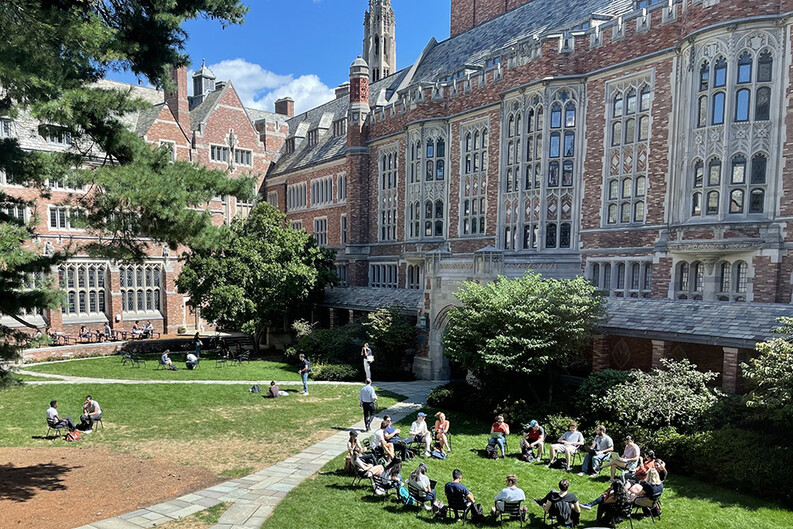Student-Led Group Takes a Broad View of National Security

Meeting at noon in Yale Law School’s Sol Goldman Courtyard, some 20 students critique approaches to national security and scrutinize how they relate to topics like antitrust, public health, race, and technology. This weekly meetup is not just lunchtime conversation, though there is food. Nor is it a conventional class, though students do earn credit. The gathering is an example of a Yale Law School learning option that lets students explore topics not part of the regular curriculum: the reading group.
“(Re)Defining National Security” is co-sponsored by the Center for Global Legal Challenges4 and the National Security Group and supervised by Gerard C. and Bernice Latrobe Smith Professor of International Law Oona A. Hathaway5 ’97. The reading group’s aim is to examine the intersection of national security and social, political, and economic issues once considered outside its realm.
Students at Yale Law School can propose a reading group6 for credit by working with a faculty member to design a syllabus on a chosen topic. Once approved, a faculty member or lecturer supervises the group, but students lead the discussions. Ten reading groups are offered this fall with titles including “Law and Theology,” “Intersectional Anti-Racism,” and “Energy Law and Policy.”
“Reading groups are one of the special joys of Yale Law School,” Hathaway said. “Students come to us with diverse experiences and expertise. Reading groups allow them to share their knowledge with one another and dig deep into topics of shared interest.”
The group on national security grew out of a discussion Lorand Laskai ’22 had with friends after reading Hathaway’s article “COVID-19 Shows How the U.S. Got National Security Wrong7” last year. Laskai said he and the others saw the work as part of a larger shift in how policymakers have begun to talk about foreign policy. They noticed that national security is no longer strictly about countering traditional threats like terrorism. Increasingly, its objectives have started to include promoting middle-class jobs, economic security, improving public health, and helping avert a climate catastrophe. For the students, this wider view was both exciting and a cause for concern.
“On one hand, many of us realize that a national security framing can be an effective way to mobilize resources and political will to address urgent challenges,” Laskai said. However, he added, national security was used to justify the internment of Japanese Americans, the Red Scare of the 1950s, the war on terror, and warrantless wiretapping. “We worry about what happens when we uncritically apply the paradigms and rhetoric of national security to address new issues.”
Just before the start of the fall term, Laskai contacted Hathaway with a concept for the group and a sparse syllabus outline. She replied with an extensive list of possible readings. That enthusiastic response, “made us feel like we were onto something,” Laskai said.
Hathaway was pleased to recognize the students’ initiative.
“I love being able to support this form of serious intellectual engagement outside the formal classroom,” she said.
Laskai said the reading group has created a sense of community among students interested in national security and related fields. He added that the opportunity to bond and learn from each other has been especially welcome after months of classes on Zoom.
“I think it has been rejuvenating to sit around discuss these issues with peers — many of whom we’ve not seen in over a year,” he said.


